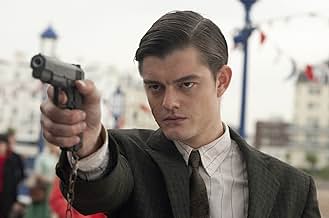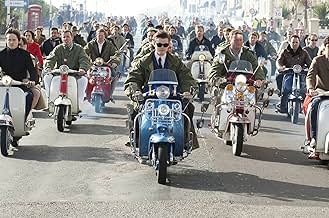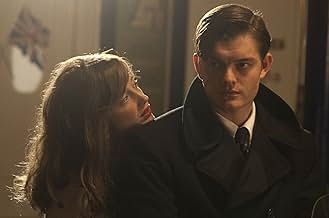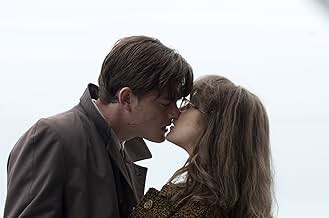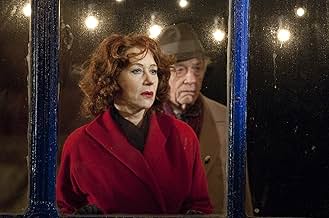IMDb RATING
5.7/10
6.9K
YOUR RATING
Charts the headlong fall of Pinkie, a razor-wielding disadvantaged teenager with a religious death wish.Charts the headlong fall of Pinkie, a razor-wielding disadvantaged teenager with a religious death wish.Charts the headlong fall of Pinkie, a razor-wielding disadvantaged teenager with a religious death wish.
- Awards
- 1 win & 8 nominations total
Phil Davis
- Spicer
- (as Philip Davis)
- Director
- Writers
- All cast & crew
- Production, box office & more at IMDbPro
Featured reviews
A really big step in the career of Richard Attenborough came when he starred in the first film of Graham Greene's novel Brighton Rock. It was so good you'd think no one would try and top it, but in 2010 the story was filmed again and the time of the story updated from post war Great Britain to the swinging sixties and the riots between the Mod and Rocker teens. That is the background for young Sam Riley to try and take a really big step in the rackets.
Which are pretty much the same as they are here although it is rare that guns are used as per the culture. Sam Riley in the lead role that helped give a boost to Richard Attenborough's career is an amoral young man who gets involved in a homicide. A revenge killing really, but a young woman who works in Helen Mirren's store can finger him for the crime.
What to do but woo Andrea Riseborough and marry her so she can't testify against him. But when Riley's crew leans on Mirren's friend John Hurt at his place of business and the guy that Riley killed was Mirren's boyfriend she'll do what it takes to take Riley down.
Some nice shots of Brighton which is like Atlantic City here, a rather run down resort area, or at least Atlantic City was before the casinos arrived. Riley, Riseborough, Mirren, and Hurt do quite well by their roles.
There is a really nice performance by Andy Serkis as a rather flamboyant gay gangster who is head of the other mob. He checks out Riley like a slab of beef on the rack at the butcher shop, but he doesn't let his lust get in the way of squelching a rival.
There's also a little more of the Catholicism of Graham Greene in the plot than there was in the first film. Even as amoral a young man as Riley does get guilt tripped quite a bit for the advantage he takes of Riseborough.
Not a bad film, but not up to what Richard Attenborough starred in.
Which are pretty much the same as they are here although it is rare that guns are used as per the culture. Sam Riley in the lead role that helped give a boost to Richard Attenborough's career is an amoral young man who gets involved in a homicide. A revenge killing really, but a young woman who works in Helen Mirren's store can finger him for the crime.
What to do but woo Andrea Riseborough and marry her so she can't testify against him. But when Riley's crew leans on Mirren's friend John Hurt at his place of business and the guy that Riley killed was Mirren's boyfriend she'll do what it takes to take Riley down.
Some nice shots of Brighton which is like Atlantic City here, a rather run down resort area, or at least Atlantic City was before the casinos arrived. Riley, Riseborough, Mirren, and Hurt do quite well by their roles.
There is a really nice performance by Andy Serkis as a rather flamboyant gay gangster who is head of the other mob. He checks out Riley like a slab of beef on the rack at the butcher shop, but he doesn't let his lust get in the way of squelching a rival.
There's also a little more of the Catholicism of Graham Greene in the plot than there was in the first film. Even as amoral a young man as Riley does get guilt tripped quite a bit for the advantage he takes of Riseborough.
Not a bad film, but not up to what Richard Attenborough starred in.
I decided to watch Brighton Rock after I had heard good things about it and I thought it would be interesting to watch. It seemed different to other films and in a genre of it's own. It was not a bad film but at the same time it wasn't the best,I would say stick to the novel and original. The start was very slow. Helen Mirren and Sam Riley gave amazing performances and owned the film, while Andrea Riseborough gave a great performance as the annoying and needy Rose. The performances and cast make up for the lack of excitement. There are a few twist within and some action scenes that make the film that bit more interesting. It's a rememberable film but I wouldn't plan on watching it again.
Sometimes it's a character you liked that attracts, like the role Philip Davis played in Midsomer Murders. Other times it's to see a great star like Helen Mirren.
Whatever the reason, it's always good to see a film based on a Graham Greene novel, like The Third Man, This Gun for Hire, The Quiet American, and many more.
A young Richard Attenborough played in this movie in the 40's, here is falls to Sam Riley (Control, Maleficent) to play the lead. He is capably assisted by Andrea Riseborough (Oblivion, Shadow Dancer), as the waitress he marries to keep her from testifying as a witness.
A good neo-noir with contributions from William Hurt and Nonso Anozie (The Grey, Game of Thrones).
Whatever the reason, it's always good to see a film based on a Graham Greene novel, like The Third Man, This Gun for Hire, The Quiet American, and many more.
A young Richard Attenborough played in this movie in the 40's, here is falls to Sam Riley (Control, Maleficent) to play the lead. He is capably assisted by Andrea Riseborough (Oblivion, Shadow Dancer), as the waitress he marries to keep her from testifying as a witness.
A good neo-noir with contributions from William Hurt and Nonso Anozie (The Grey, Game of Thrones).
As a Brighton resident, I had to see this, but also probably spent more time looking at the locations (and more critically) than a normal viewer. On the plus side, there is excellent cinematography, and the film creates an atmospheric mid 60's version of Brighton that might be convincing to anyone too young to remember that time, but which contained too many jarring anachronisms for me. For example Rose lives in a tower block, which could have existed in 1964, and would have still been soulless and depressing, but would also have been practically brand spanking new, not run down and shabby with 20 years of neglect. This highlights another failing of the film, the clichéd exaggerated unrelenting squalor that all the criminals live in, which again is untrue to the period, twitching net curtains and keeping up (often threadbare) appearances was how things worked then, in working class neighbourhoods especially. You could create an oppressive atmosphere from these real elements (and the culture clash of the pre and post war worlds) perhaps more easily than from this invented total squalor.
So if the world the film creates is a Hollywood version of 1960's Brighton, do the characters engage you? Well I loved Helen Mirren and John Hurt, they brought a touch of class whenever they appeared, and Phil Davis is another very fine actor who is always watchable. Sadly the two main characters don't quite pull it off, and if I have to lay the blame it is chiefly with Sam Riley's Pinkie. If he could have alternated his cold unsmiling thuggishness with some charm, shown Rose a little tenderness some vulnerability even, that would have made her falling for him, and her naive notion that she could save him more convincing, and maybe made his cruelty and occasional physical violence toward her more shocking. Andrea Riseborough as Rose gives a fair performance, given that she does not have much to work with.
I'm sorry if this review makes the film sound worse than it is, because truth be told despite its failings it is consistently watchable, and still managed to engage me. An interesting failure.
So if the world the film creates is a Hollywood version of 1960's Brighton, do the characters engage you? Well I loved Helen Mirren and John Hurt, they brought a touch of class whenever they appeared, and Phil Davis is another very fine actor who is always watchable. Sadly the two main characters don't quite pull it off, and if I have to lay the blame it is chiefly with Sam Riley's Pinkie. If he could have alternated his cold unsmiling thuggishness with some charm, shown Rose a little tenderness some vulnerability even, that would have made her falling for him, and her naive notion that she could save him more convincing, and maybe made his cruelty and occasional physical violence toward her more shocking. Andrea Riseborough as Rose gives a fair performance, given that she does not have much to work with.
I'm sorry if this review makes the film sound worse than it is, because truth be told despite its failings it is consistently watchable, and still managed to engage me. An interesting failure.
One of the perils of remaking a classic film is that your version will be compared unfavourably with the original. Of course, there have always been film-makers who have dared to brave this peril, and it is as well that there have been, otherwise we would have been deprived of, for example, Kenneth Branagh's interpretation of "Henry V", which spoke to the eighties just as Laurence Olivier's had spoken to the forties.
Graham Greene's novel "Brighton Rock" was famously adapted for the screen by the Boulting brothers in 1947, and their version is widely regarded as one of the greatest films from the "Golden Age" of the British cinema during the forties and fifties. Rowan Joffé's recent remake has not been universally well-received, particularly by those who believe that nothing can ever compete with its illustrious predecessor. Much as I admire the Boultings' film, however, I have to admit that the newcomer has many virtues of its own.
The main character is Pinkie Brown, the youthful leader of a gang of thugs whose principal activity is protection racketeering. Early in the film, Pinkie murders Hale, a member of a rival gang, in revenge for the murder by Hale of Pinkie's colleague Kite. (In the original novel and the 1947 film, Hale was a journalist who had been investigating the gang's activities. Another change is the date at which the story takes place; although the novel and original film are both set in the 1930s, this adaptation is set during the Mods and Rockers era of the 1960s).
Pinkie tries to cover his tracks by creating a false alibi for himself, which leads to the commission of further crimes and to Pinkie's marriage to Rose, a young waitress who he believes might be in possession of evidence which could send him to the gallows. Pinkie is not in love with Rose, but marries her because at the time the film is set there was a rule of English law that a wife could not give evidence against her husband. The ending is closer to the one Greene wrote in his novel, although Joffé keeps the famous twist which the writer introduced when he produced the 1947 screenplay.
Joffe said that he made the film because, on reading the novel, he "fell absolutely in love with the character of Rose", and the treatment of this character is, in my view, the one area in which the modern film is better than the earlier one. Andrea Riseborough's interpretation of the character- downbeat, dowdy, bespectacled and needy- seems just right for the role. Rose responds to Pinkie's overtures because he is the only person to have shown her any affection, and she is naïve enough to overlook his obvious criminality and not to realise that his affection for her is feigned. Carol Marsh's Rose, however, was rather too glamorous; it was difficult to imagine her as someone lacking in male admirers.
There are also good performances from two veterans of the British cinema, John Hurt and Helen Mirren. Hurt plays the bookmaker Phil Corkery, who has a more important role in this adaptation than he does in the book. Mirren plays Ida Arnold, the woman whose determination to get at the truth results in Pinkie's downfall. In the 1947 Ida was played by Hermione Baddeley as a blowsy, ageing showgirl and a casual acquaintance of Hale; here she becomes the manageress of the café where Rose works and a close friend of the murdered man.
I was less impressed by Sam Riley who, as Pinkie, lacked the sense of menace and evil which Richard Attenborough brought to the role. At 30, moreover, Riley seemed too old to play a teenager. (Attenborough would have been 24 in 1947, and looked younger). Also, I couldn't see the point of setting the story in the 1960s, as the "Mods and Rockers" element added little, or nothing, to Greene's story. Pinkie's gang, and the rival Colleoni gang, were both part of Brighton's own criminal underworld, whereas the Mods and Rockers were drawn from all over the country, especially London, and merely chose Brighton, and other seaside resorts, as convenient places for their battles.
Joffé has also discarded a lot of the religious content of the original novel. Greene made Ida an atheist whose system of values was based upon secular ideas of "right" and "wrong", as opposed to Pinkie and Rose, both believing Catholics who believed firmly in "good" and "evil". This opposition between two contrasting attitudes to morality was an important theme of the novel, but it is not something dwelt on at length in either film. The 1947 version downplayed Pinkie's religious beliefs, possibly as a concession to Catholics unhappy with the idea of one of their flock being portrayed as a violent criminal, although it did concentrate on Rose's spiritual development. The modern film acknowledges that both Pinkie and Rose are "Romans", but for the most part avoids theological issues and turns Greene's story into the basis for a grim, grey neo-noir type crime thriller. (The 1947 film was set during a sunny summer Bank Holiday; this version appears to have been shot in winter, with Brighton largely deserted by holidaymakers). It is up to the viewer to decide which approach he or she prefers. 7/10
Graham Greene's novel "Brighton Rock" was famously adapted for the screen by the Boulting brothers in 1947, and their version is widely regarded as one of the greatest films from the "Golden Age" of the British cinema during the forties and fifties. Rowan Joffé's recent remake has not been universally well-received, particularly by those who believe that nothing can ever compete with its illustrious predecessor. Much as I admire the Boultings' film, however, I have to admit that the newcomer has many virtues of its own.
The main character is Pinkie Brown, the youthful leader of a gang of thugs whose principal activity is protection racketeering. Early in the film, Pinkie murders Hale, a member of a rival gang, in revenge for the murder by Hale of Pinkie's colleague Kite. (In the original novel and the 1947 film, Hale was a journalist who had been investigating the gang's activities. Another change is the date at which the story takes place; although the novel and original film are both set in the 1930s, this adaptation is set during the Mods and Rockers era of the 1960s).
Pinkie tries to cover his tracks by creating a false alibi for himself, which leads to the commission of further crimes and to Pinkie's marriage to Rose, a young waitress who he believes might be in possession of evidence which could send him to the gallows. Pinkie is not in love with Rose, but marries her because at the time the film is set there was a rule of English law that a wife could not give evidence against her husband. The ending is closer to the one Greene wrote in his novel, although Joffé keeps the famous twist which the writer introduced when he produced the 1947 screenplay.
Joffe said that he made the film because, on reading the novel, he "fell absolutely in love with the character of Rose", and the treatment of this character is, in my view, the one area in which the modern film is better than the earlier one. Andrea Riseborough's interpretation of the character- downbeat, dowdy, bespectacled and needy- seems just right for the role. Rose responds to Pinkie's overtures because he is the only person to have shown her any affection, and she is naïve enough to overlook his obvious criminality and not to realise that his affection for her is feigned. Carol Marsh's Rose, however, was rather too glamorous; it was difficult to imagine her as someone lacking in male admirers.
There are also good performances from two veterans of the British cinema, John Hurt and Helen Mirren. Hurt plays the bookmaker Phil Corkery, who has a more important role in this adaptation than he does in the book. Mirren plays Ida Arnold, the woman whose determination to get at the truth results in Pinkie's downfall. In the 1947 Ida was played by Hermione Baddeley as a blowsy, ageing showgirl and a casual acquaintance of Hale; here she becomes the manageress of the café where Rose works and a close friend of the murdered man.
I was less impressed by Sam Riley who, as Pinkie, lacked the sense of menace and evil which Richard Attenborough brought to the role. At 30, moreover, Riley seemed too old to play a teenager. (Attenborough would have been 24 in 1947, and looked younger). Also, I couldn't see the point of setting the story in the 1960s, as the "Mods and Rockers" element added little, or nothing, to Greene's story. Pinkie's gang, and the rival Colleoni gang, were both part of Brighton's own criminal underworld, whereas the Mods and Rockers were drawn from all over the country, especially London, and merely chose Brighton, and other seaside resorts, as convenient places for their battles.
Joffé has also discarded a lot of the religious content of the original novel. Greene made Ida an atheist whose system of values was based upon secular ideas of "right" and "wrong", as opposed to Pinkie and Rose, both believing Catholics who believed firmly in "good" and "evil". This opposition between two contrasting attitudes to morality was an important theme of the novel, but it is not something dwelt on at length in either film. The 1947 version downplayed Pinkie's religious beliefs, possibly as a concession to Catholics unhappy with the idea of one of their flock being portrayed as a violent criminal, although it did concentrate on Rose's spiritual development. The modern film acknowledges that both Pinkie and Rose are "Romans", but for the most part avoids theological issues and turns Greene's story into the basis for a grim, grey neo-noir type crime thriller. (The 1947 film was set during a sunny summer Bank Holiday; this version appears to have been shot in winter, with Brighton largely deserted by holidaymakers). It is up to the viewer to decide which approach he or she prefers. 7/10
Did you know
- TriviaPhil Davis (Frank Spicer) previously played the mod Chalky in Quadrophenia (1979), which was likewise set in Brighton in 1964.
- GoofsWhen Rose opens the record player, it has a modern British plug on it. In 1960s Britain plug pins were round. Safety switches wall sockets would not have been in place at this time, either.
- ConnectionsFeatured in Breakfast: Episode dated 28 January 2011 (2011)
- How long is Brighton Rock?Powered by Alexa
Details
- Release date
- Countries of origin
- Official site
- Language
- Also known as
- Băng Đảng Brighton
- Filming locations
- Production companies
- See more company credits at IMDbPro
Box office
- Budget
- $12,000,000 (estimated)
- Gross US & Canada
- $229,653
- Opening weekend US & Canada
- $32,774
- Aug 28, 2011
- Gross worldwide
- $2,913,599
- Runtime
- 1h 51m(111 min)
- Color
- Sound mix
- Aspect ratio
- 2.39 : 1
Contribute to this page
Suggest an edit or add missing content





